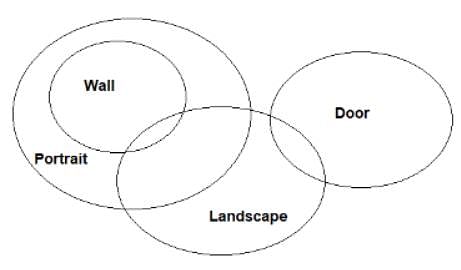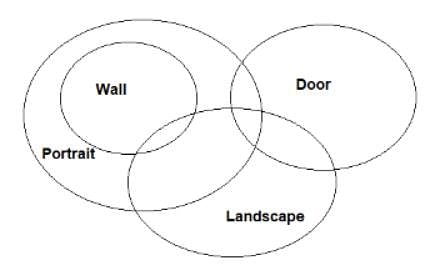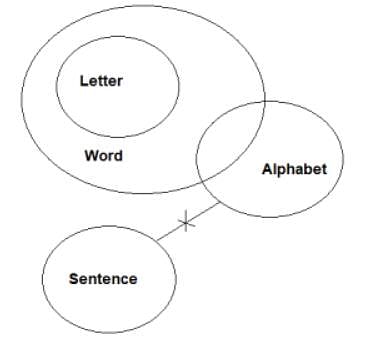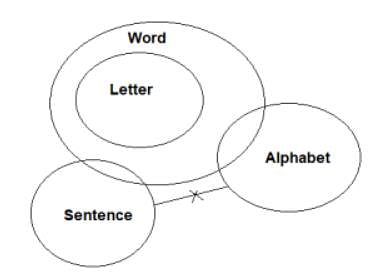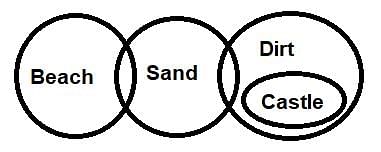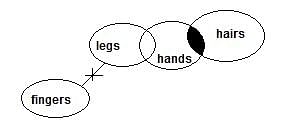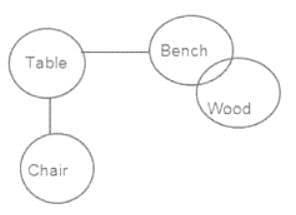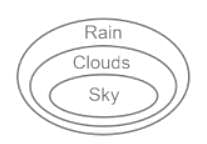Test: Syllogism (April 3) - CAT MCQ
10 Questions MCQ Test Daily Test for CAT Preparation - Test: Syllogism (April 3)
In the question below there are three statements followed by three conclusions I, II and III. You have to take the three given statements to be true even if they seem to be at variance from commonly known facts and then decide which of the given conclusions logically follows from the three statements disregarding commonly known facts.
Statements:
All wall are portrait.
Some wall are landscape.
Only few landscape are door.
Conclusions:
I. All door being landscape is a possibility.
II. Some portrait are door.
III. Some wall are door.
Statements:
All wall are portrait.
Some wall are landscape.
Only few landscape are door.
Conclusions:
I. All door being landscape is a possibility.
II. Some portrait are door.
III. Some wall are door.
In the question below there are four statements followed by three conclusions I, II and III. You have to take the three given statements to be true even if they seem to be at variance from commonly known facts and then decide which of the given conclusions logically follows from the four statements disregarding commonly known facts.
Statements:
Only few color are pink.
Some pink are dark.
No dark is blind.
All pink are black.
Conclusions:
I. Some black are color.
II. Some black are not blind.
III. All dark being black is a possibility.
In the question below there are three statements followed by three conclusions I, II and III. You have to take the three given statements to be true even if they seem to be at variance from commonly known facts and then decide which of the given conclusions logically follows from the three statements disregarding commonly known facts.
Statements:
Only words are letters.
Mostly alphabets are words.
No sentence is alphabet.
Conclusions:
I. Some words are letters.
II. Some words are sentences.
III. Some letters are alphabets.
In the question below there are three statements followed by three conclusions I, II and III. You have to take the three given statements to be true even if they seem to be at variance from commonly known facts and then decide which of the given conclusions definitely follows from the three statements disregarding commonly known facts.
Statements:
Only a few Company is Private
All School is Private
No School is Public
Conclusions:
I. Some School can be Company
II. Some Private can be Public
III. Some Public is not Company
In the question below there are three statements followed by three conclusions I, II and III. You have to take the three given statements to be true even if they seem to be at variance from commonly known facts and then decide which of the given conclusions logically follows from the three statements disregarding commonly known facts.
Statements:
42% Beach are Sand
A few Sand are Dirt
Only Dirt is Castle
Conclusions:
I. No Beach is Castle
II. Some Dirt are not Sand
III. All Dirt cannot be Beach
In the question below there are three statements followed by two conclusions I and II. You have to take the three given statements to be true even if they seem to be at variance from commonly known facts and then decide which of the given conclusions logically follows from the four statements disregarding commonly known facts.
Statements:
Mostly pets are cats
Only cats are dogs
No cats are rabbits
Conclusions:
I. Some pets are rabbits.
II. All pets being rabbits is not a possibility.
In the question below are given three statements followed by two conclusions numbered I and II. You have to take the given statements to be true even if they seem to be at variance from commonly known facts. Read all the conclusions and then decide which of the given conclusions logically follows from the given statements disregarding commonly known facts.
Statements:
Only a few rides are trips.
No trip is mountain.
All mountains are trees.
Conclusions:
I: Some trees are not trips.
II: All rides being trips is not a possibility.
In the question below there are three statements followed by two conclusions I and II. You have to take the three given statements to be true even if they seem to be at variance from commonly known facts and then decide which of the given conclusions logically follows from the four statements disregarding commonly known facts.
Statements:
No fingers are legs
Mostly legs are hands
Only a few hands are hairs
Conclusions:
I. Some legs are not hairs
II. All hands being fingers is a possibility.
In the question below are given three statements followed by two conclusions I, II. You have to take the given statements to be true even if they seem to be at variance from commonly known facts. Read all the conclusions and then decide which of the given conclusions logically follows from the given statements disregarding commonly known facts.
Statements:
No chair is a table.
No table is a bench.
Only a few benches are wood.
Conclusions:
I. Some wood being chair is a possibility.
II. Some wood is not a table.
In the question below, there are two statements followed by two conclusions numbered I and II. You have to take the given statements to be true even if they seem to be at variance with commonly known facts. Read all the conclusions and then decide which of the given conclusions logically follows from the given statements disregarding commonly known facts.
Statements:
All Sky are Clouds.
All Clouds are Rain.
Conclusions:
I. All Sky are Rain.
II. Some Rain are Sky.
|
152 docs|327 tests
|


